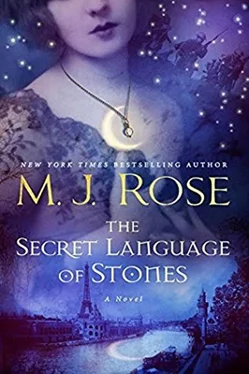I took the book off the shelf and let it fall open to a random page.
Know that it is a corpse who loves you and adores you and will never, never leave you!… Look, I am not laughing now, crying, crying for you, Christine, who have torn off my mask and who therefore can never leave me again!… Oh, mad Christine, who wanted to see me!
I shivered and put the book back. As I did, a volume with a curious purple stain on its green spine caught my attention because of its similarity to La Lune’s signature crescent-moon shape. Was it wine that colored the leather? Certainly not blood. I pulled out the book. Oscar Wilde’s The Soul of Man Under Socialism , a dry title indeed. The book fell open to a familiar passage.
Art is the most intense mode of Individualism the world has known.
Beside it, in ink, Jean Luc had written:
The soul of the artist fighting the mediocrity of the masses. An artist, like a lover, cares not for convention. In fact, convention is his enemy.
A memory opened in my mind. My father and I after dinner, reading Jean Luc Forêt’s column on individualism, quoting this passage from Wilde’s essay. My father became excited. For exactly that reason, my father explained to me, freedom of expression should be defended at all costs.
As I flipped through the pages, I found several more highlighted phrases.
“Know thyself” was written over the portal of the antique world. Over the portal of the new world, “Be thyself” shall be written.
The notion appealed to me; I wanted to write it down and send it home to my father. He’d appreciate it every bit as much as I had. For a moment I envisioned the spirited conversation Jean Luc, my father, and I might have had around the dinner table. My mother, smiling her little cat smile, agreeing with just an elegant nod of her head while my father had much to say and many questions to ask.
“He loved to read,” Madame Alouette said. Her return startled me.
I turned to her. “So do I.” What made me say that? To voice aloud what we shared? She looked at me gently. Sensing my emotional reaction to her son, or caught up in her own?
“If there’s anything you’d like to borrow, please do. Jean Luc loved lending his books to his friends.”
Overwhelmed by the offer, I searched the shelves, reading through the titles. How to know which would give me the deepest view into the man’s soul?
“I think I’ll just take this one,” I finally said, referring to the Wilde already in hand. Surely not the most romantic of his books, but all the annotations in Jean Luc’s handwriting were too intriguing to ignore.
“I am sorry to rush you, but we are having a little dinner this evening and I need to dress,” she said, gesturing to the door.
“May I just look out of the window first?”
“The window?”
“Just for a second. To see the street from here.” As I asked, I realized how eccentric a request it must seem. But how to tell her I wanted to gaze upon what he had gazed upon? How to explain I wanted to fill my eyes with what he had seen?
“Certainly, it’s a lovely view,” she said, and opened the curtains for me and I looked down onto Parc Monceau. “One of his first Ma chère columns from the front referred to this view-you must read it.”
I stood at the window for a few moments, trying to see what Jean Luc had seen, but Paris wasn’t dressed in lights because of the war and I couldn’t see anything but a dismal foggy night settled over a patch of darkness.
Ma chère,
Here in the dark, as the kerosene burns, I try to summon your perfume and pretend I smell it instead of this stink. All around us, all the time, lives are lost. Every minute of every hour of every day and night. We steel ourselves from what we do as we carry the wounded out of danger, getting their blood on our hands, our boots, our uniforms… as we ship them off to the temporary field hospitals or, worse, send them back home for burials. We try not to think of the dead who we have no choice but to bury here on the battlefield.
Breathe, breathe, I tell myself, when the enormity of the loss overwhelms me. When I think of the achievements the world will never know. What great novel will never be written because its author was blown up. What wonderful painting that could have brought such joy will never be painted because its artist has expired after losing too much blood.
We march on roads and through fields that have become cemeteries. Nothing picturesque and peaceful like the ones we have at home. There are no graceful cobblestone paths here. No stained glass windows in artful mausoleums.
There is no romance in the impromptu graveyards at the front. Nothing like Père-Lachaise in Paris. If I were home, I would escort you there today. It is a perfect place to ruminate on love. Shall you go for me?
Take the metro, of course-Père-Lachaise is too far to walk. Before the war, there were always tourists visiting the famous resting place… but since then, other than sad funeral parties burying a soldier, the mysterious memorial park is rarely crowded.
After walking through the refined wrought iron gates, turn right. Père-Lachaise is laid out like a small town with street signs clearly visible, so if you ask the caretaker for a map, you should have no trouble getting about. Lofty trees shade the allées. Flowers bloom, bees buzz, birds fly, squirrels and rabbits and cats make the cemetery their home. There is much life there in the land of the dead. Just as there is here at the front.
The first tomb I want you to visit is on avenue Casimir Périer, the same name as the tiny street in the 6th arrondissement, but here it is in the seventh section. You will see it from a distance for it is one of the tallest monuments in the area. Not as high as the leafy trees offering shade, but soaring nonetheless, the way well-designed High Gothic structures do.
When you arrive, pause to take in its melancholy grandeur. Then stroll around its perimeter, peer inside its open arches at the two stone effigies, lovers sleeping side by side on their funeral biers.
Peter Abelard was a twelfth-century philosopher and theologian at the cathedral school of Notre-Dame. Considered the boldest thinker of his time, he was quite famous. Héloïse, the niece of a secular canon named Fulbert, was a young woman renowned for her brilliant prose writing, who spoke Latin, Greek, and Hebrew. Yearning to learn even more, she persuaded her uncle to hire Abelard to teach her.
At thirty-nine, despite his fame and popularity, Abelard remained chaste. Héloïse, in her early twenties, was as well.
The great meeting of their minds led to a meeting of their souls and eventually their flesh, even though the political and religious climates of their time forbid their being together.
Abelard wrote he was “all on fire” for Héloïse and decided “she is the one to bring to my bed.”
Despite knowing sex was a sin, neither could resist and they met in secret, insatiable, they both wrote, exploring each other with a passion that until then they’d devoted solely to their intellect.
“My hands strayed more often to her bosom than to the pages, love drew our eyes to look on each other more than reading kept them on our texts,” Abelard wrote.
And then Héloïse became pregnant.
“Oh, how great was the uncle’s grief when he learned the truth, and how bitter was the sorrow of the lovers when we were forced to part!” Abelard wrote.
To protect Héloïse, Abelard took her to Brittany. There, they wed in secret and she went to stay with the nuns in a convent in Argenteuil while Abelard returned to Paris to make amends. But Héloïse’s uncle, believing Abelard had cast off his niece, greeted him by having him brutally beaten and castrated.
Читать дальше












